| Srl | Item |
| 1 |
ID:
192632
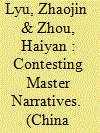

|
|
|
|
|
| Summary/Abstract |
The growing tension between mainland China and Taiwan has a cultural aspect closely related to national identity. We focus on recent history curriculum changes in the mainland and in Taiwan and find that education authorities on both sides have implemented master narratives for content selection in and organization of history textbooks. In mainland China, the master narrative of pluralist unity constructs a geographically consistent Chinese nation throughout history, which bolsters the state's current claim to a territorial integrity including Taiwan. In Taiwan, the master narrative of multiculturalism becomes the essence of Taiwanese identity, and weakens Sinocentrism in Taiwanese official historiography.
|
|
|
|
|
|
|
|
|
|
|
|
|
|
|
|
| 2 |
ID:
161346
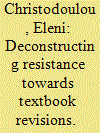

|
|
|
|
|
| Summary/Abstract |
This article investigates Greek Cypriot ‘discourses of resistance’ to potential revisions of history textbooks as part of a wider peace education process. Although changing history textbooks towards a more inclusive and pluralistic narrative is arguably a necessary step for a sustainable peace, efforts to do so have met with strong resistance and ultimately failed. Existing studies have illuminated the problematic historical content of these textbooks and often point towards the controversies raised, but rarely do they offer an in-depth analysis of these discourses about textbooks. This study seeks to fill this gap by deconstructing these ‘discourses of resistance’ to reach a deeper understanding of why this aspect of peacebuilding has failed. Empirical findings through an analysis of interviews, policy documents, newspapers, speeches and circulars indicate a pronounced link between education and security, which has until recently remained at the periphery of peacebuilding research. Discourses of resistance present changes to history textbooks as a betrayal and threat to the nationalist struggle, a process I argue constitutes the securitisation of history textbooks.
|
|
|
|
|
|
|
|
|
|
|
|
|
|
|
|
| 3 |
ID:
164319
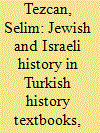

|
|
|
|
|
| Summary/Abstract |
This article examines the treatment of Jewish and Israeli history in post-World War II Turkish textbooks. Jewish and Israeli history remains largely relegated to the margins in the books. The Jews of Arabia are shown in an antagonistic role during the advent of Islam, while the Jews of the Ottoman Empire are generally subsumed under the category of non-Muslims. The Ottoman reception of the Spanish (Sephardi) Jews is used to exemplify Turkish tolerance. The subject of the Jewish Holocaust is usually avoided. The older textbooks strike a more balanced approach towards Israel than the recent ones.
|
|
|
|
|
|
|
|
|
|
|
|
|
|
|
|
| 4 |
ID:
186891
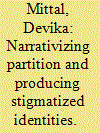

|
|
|
|
|
| Summary/Abstract |
The independence from the British rule was accompanied with partition of the Indian subcontinent on religious lines. Since partition in 1947, the two nation-states India and Pakistan have been hostile toward each other. Communalism has also been a major challenge in both these countries. The current study locates this continued hostility or the “enemy” narrative that the countries harbor not just of each other, but which also shapes the experience of a religious community within their territory. Limiting the inquiry to the Indian side, this paper explores the production of the “enemy” narrative through the discursive knowledge around partition and how it locates Muslims. The paper analyzes textbooks of two education boards in India and argues that the narrative excludes the contribution of Muslims in the nationalist movement, charts out an uncritical history of the demand for partition, and stigmatizes the Muslim community as “communal” and “unpatriotic.”
|
|
|
|
|
|
|
|
|
|
|
|
|
|
|
|
| 5 |
ID:
183240
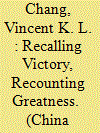

|
|
|
|
|
| Summary/Abstract |
The recent surge in public remembrance of the Second World War in China has been substantially undergirded by a centrally planned and systematically implemented discursive shift which has remained overlooked in the literature. This study examines the revised official narrative by drawing on three cases from China's school curriculum, museums and formal diplomacy. It finds that the once dominant trope of “national victimization” no longer represents the main thrust in the Chinese Communist Party's (CCP) rhetoric on the Second World War. Under Xi Jinping, this has been replaced by a self-assertive and aspirational narrative of “national victory” and “national greatness,” designed to enhance Beijing's legitimacy and advance its domestic and foreign policy objectives. By emphasizing national unity and CCP–KMT cooperation, the new narrative offers an inclusive and unifying interpretation of China's war effort in which the victory in 1945 has come to rival the 1949 revolution as the critical turning point towards “national rejuvenation.” The increasingly Sino-centric and centrally controlled narrative holds implicit warnings to those challenging Beijing's claim to greatness.
|
|
|
|
|
|
|
|
|
|
|
|
|
|
|
|